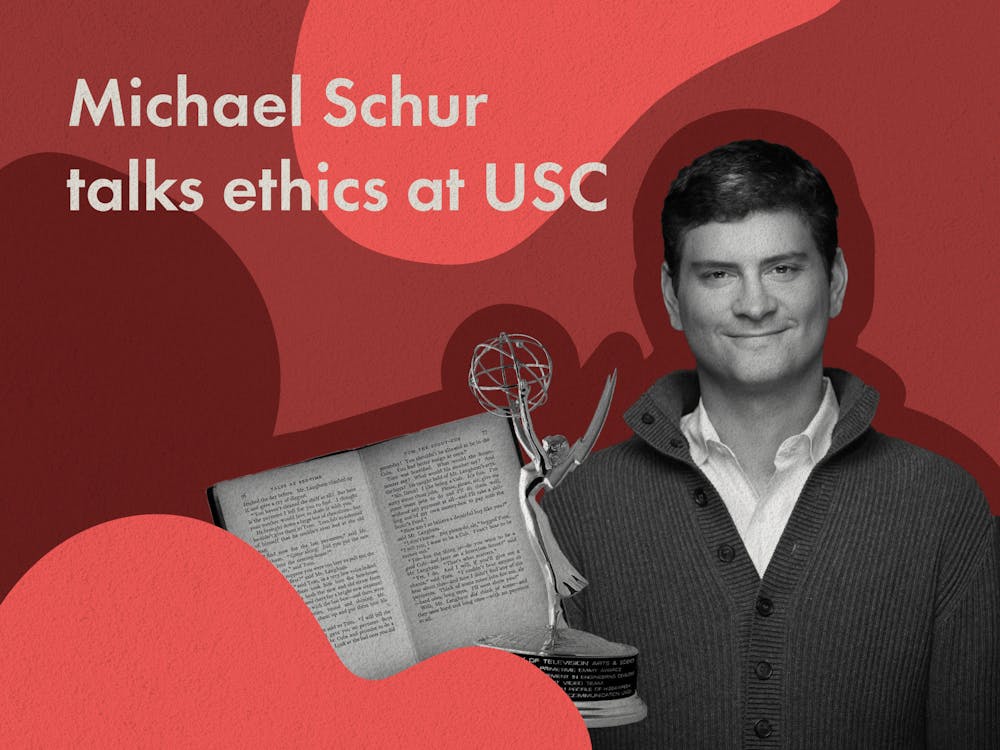Students and faculty alike stare as comedy writer and author Michael Schur takes a seat across from Student Body President Emmie Thompson. Over his long career, Schur has earned multiple Emmy awards and nominations for his part in writing acclaimed TV shows, "The Good Place," "The Office," "Parks and Recreation," "Brooklyn Nine-Nine" and more. However, that is not what Schur came to USC to talk about. When the First Year Reading Experience Committee Executive Director Dan Friedman introduced Schur to the crowd of awestruck USC students, he wanted to know Schur’s answer to one question: How do you be a good person?
Schur’s speech marked the 29th annual FYRE, presenting his book "How to Be Perfect". He published the book in 2022 after having wrapped up the final season of "The Good Place." The TV series questions individuals’ morality and what it takes to make a positive impact in today’s society. To Schur, who is still curious about the world of ethics and his place in it, writing the book was a natural progression from the series.
“There were certainly ideas or concepts that I delved into that we didn’t talk about on the show,” Schur said. “It was like everything I’ve been writing about on the show is basically captured by this idea.”
After wrapping up the final season, Schur still desired to delve deeper into the world of ethics. His goal in researching philosophers like Immanuel Kant, Jeremy Bentham, Aristotle and more was to summarize their ideas so that their teachings could be accessible to everyone.
The FYRE Committee chose to assign "How to Be Perfect" as the USC 2023 first-year reading novel out of a list of 100 nominations made by members of the community. The cover itself is designed by Ivy Nguyen, a 2022 graduate from a senior-level design class. Nguyen reflected the book’s humorous nature with a see-saw to reflect the struggle to maintain a perfect ethical balance — a reference to Aristotle’s golden mean of virtue described in the novel.
First-year students taking University 101 discuss the book in class, applying it to their lives in order to manage their first year in a new environment with new responsibilities: not only as college students but also as young adults in today's society.
“The book was selected because we hope it will spark meaningful conversation about the bigger questions in life,” Friedman said. “It will allow us to think more deeply about what it means to be a good person in today’s complex world.”
According to Schur, people begin making ethical decisions as early as nine years old without even giving it a second thought. As people grow older, their impact on the community grows as well, and the decisions they make get more challenging.
“You’re constantly making decisions based on a number of questions that you’re asking yourself,” Schur said. “To me, the thing that makes for a good person is if one of the very first questions you’re always asking yourself is: ‘Is this making the world a better place or a worse place?’”
In a college setting, students’ proximity to their peers through dorm living and shared classes leads to their daily decisions having a greater impact on others. Thus, whether those decisions are harming or benefiting the community becomes a greater concern, Schur said.
”It‘s like a boiling cauldron of ethics in here,” he said.
Junior Lizzie Stephenson echoes this notion. Stephenson believes the book to be helpful to freshmen, especially because transitioning to a college environment creates a lot of change in students' lives and their viewpoints.
On the other hand, "How to Be Perfect" also applies emphasis on valuing your own well-being. “Moral exhaustion” is a term Schur coined in the novel describing the feeling of fatigue that stems from failing to take into account your own needs in favor of trying to have a good impact.
“There was one chapter that talked a lot about how you put a lot of pressure on what will make everyone the happiest,” Stephenson said. “So I think that sort of made me think I want to focus more on my own values.”
In creating his work, Schur pulls inspiration from his own passions, particularly referencing community, kindness, optimism and self-improvement. Schur has undoubtedly left a significant footprint in the world of media, effectively creating a blend of comedy and philosophy that is relatable to a large audience. However, Schur does not believe it is up to him to choose his legacy.
"The only part of it that really matters isn't anything external,” Schur said. “It's the making of the actual work."
As TV production has grown rapidly in recent years, that field of work has come under attack, with less compensation and career opportunities for writers. As a part of the Writers Guild of America, Schur went on strike along with many other writers to protect their positions in the film industry. September 27 marked the end of the strike, with Major Hollywood Studios implementing a three-year deal to protect writers' positions in the creation of media. The strike was an opportunity for Schur to be part of something greater than himself, which would help the world of media at large — something he put a lot of thought into while writing the book, he said.
“People who work hard and care about their craft should have a viable career ahead of them,” Schur said. “If we lose that, we’re losing the soul of American creativity.”
Creativity is not the only thing that makes for a successful career in comedy, though. It is easy to glamorize successful individuals such as Schur; he has an easy manner about him that comes from years of working with acclaimed professionals such as writer Greg Daniels, actress Kristen Bell and countless other celebrities. However, the road to fame in the art of comedy does not come easy.
Schur thinks back on the collective sound of 200 pages being turned in a cramped meeting room. He is four hours into a Saturday Night Live sketch reading for the upcoming episode. Not a single person laughs as they read through joke after joke he has painstakingly written and revised. In moments like these, Schur remembers feeling his self-esteem plummet to rock bottom, he said.
“TV is good for giving you a thick skin because you get rejected a lot,” Schur said. “You’ll fail all the time.”
Fear of failure never stopped Schur from chasing his dreams, though. Schur knew he wanted to be a comedy writer since he began watching shows like SNL and reading the Harvard Lampoon, the world’s oldest continuously published satire magazine. In his application to Harvard, he cited the magazine as one of his motivators for enrolling in the University.
“I just knew it was my thing,” Schur said. “Writing TV, it’s all I’ve ever wanted to do.”
Ethics and comedy can go hand in hand. By drawing on their personal outlook on the world, comedians can share their own philosophies.
”If you’re being funny, I think people are much more receptive to it,” Schur said.
Schur finds that comedy itself can be a form of self-expression and a way to make sense of the larger world around you. There is a myth in the world of arts that in order to make meaningful work, you have to draw from a place of trauma and sadness. Schur spent his career trying to prove those thinkers wrong, he said.
“I think the best kind of comedy to me has something to say,” Schur said. “It comes from someplace truthful and honest.”



